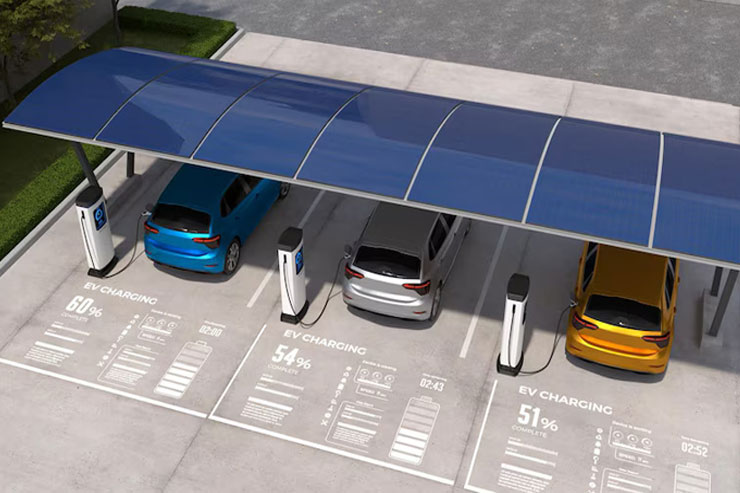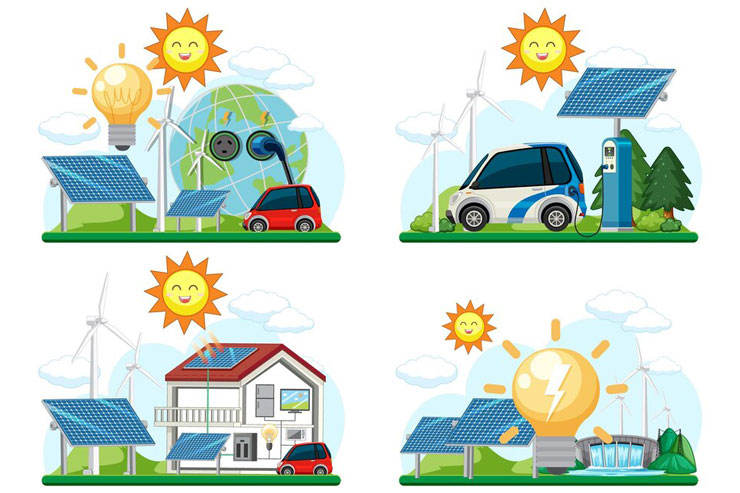As the world shifts towards sustainable living, solar-powered carports are quickly becoming a popular option for utilising solar power in innovative ways. Unlike traditional carports, solar carports do more than just protect vehicles from heat and other elements; they harness solar energy to power homes, businesses, and even the vehicles parked beneath them. This innovative approach not only maximises the utility of open spaces but also significantly cuts down on electricity bills. By converting everyday parking areas into energy-generating hubs, solar carports are an excellent example of how practical innovations can contribute to environmental sustainability. They are adaptable to various settings, from residential driveways to large corporate parking lots, making them a versatile option for energy generation in urban and suburban areas.
What is a Solar Carport?
A solar carport is a structure that uses solar panels in place of traditional roofing materials. It not only provides shade and protection for parked vehicles but also captures sunlight and converts it into electricity, effectively serving as both a car shelter and a source of renewable energy.
Types of Solar Carports
Solar carports are available in various designs to meet diverse needs, from residential options that add to home aesthetics to commercial installations aimed at reducing energy expenses and promoting sustainability. For those interested in a hands-on approach, DIY kits provide an opportunity to personally build and integrate solar solutions at home.
Residential Solar Carports
These are designed specifically for home use, emphasising aesthetics and energy efficiency. They often feature adaptable designs to complement home architecture and involve considerations like optimal panel placement and connection to home energy systems.
Commercial Solar Carports
For businesses, solar carport commercial setups can reduce operational costs and demonstrate a commitment to renewable energy. Examples include large installations at corporate parking lots or retail centres, providing substantial energy savings and marketing advantages.
DIY Solar Carport Options
DIY kits have made it possible for homeowners to build their own solar carports. These kits include all necessary components such as panels, inverters, and racking systems, guiding users through the construction and installation process.
Benefits of Solar Carports
Solar carports provide a range of benefits, from practical utilities to environmental impacts. They not only generate substantial energy to power nearby needs and contribute excess to the grid but also offer significant cost savings through reduced utility bills. Environmentally, they decrease carbon emissions and provide durable protection for vehicles against natural elements.
Energy Generation
Solar carports are significant energy producers, often generating enough power to meet all the parking facility’s lighting needs and contributing excess power back to the grid.
Cost Savings
They offer financial benefits through reduced electricity bills and potential earnings from government feed-in tariffs or renewable energy certificates.
Environmental Impact
By generating clean energy, solar carports play a crucial role in reducing a household or business’s carbon footprint.
Protection for Vehicles
They provide vehicles with protection from weather elements like rain, snow, and UV radiation, potentially extending the lifespan of the vehicle.
Features of a Solar-Powered Carport
Solar-powered carports are equipped with advanced features to optimise their efficiency and utility. They utilise high-quality solar panels available in monocrystalline or polycrystalline forms, which differ in efficiency and aesthetics. Additionally, battery storage systems capture excess energy for later use, ensuring continuous power supply. At the same time, integrated charging stations support the growing electric vehicle market, enhancing the carport’s functionality as a sustainable energy solution.
Solar Panels
The choice between monocrystalline and polycrystalline panels affects efficiency, cost, and appearance.
Battery Storage Options
Batteries store excess energy for use during non-sunny periods, enhancing the carport’s utility.
Charging Stations
Modern solar carports often include EV charging stations, making them a comprehensive green energy solution.
Installation Process of a Solar Panel Carport
The installation process of a solar panel carport is comprehensive, designed to ensure durability, efficiency, and compliance. Here are the typical steps involved.
Site Assessment
Professionals assess the site to ensure it is suitable for a solar installation in terms of space, sunlight exposure, and ground stability.
Design and Permitting
Designs must adhere to local building codes and standards, with necessary permits obtained from local authorities.
Installation Steps
The installation process includes setting up supports, installing panels, and connecting the system to the power grid.
Maintenance Requirements
Maintenance involves regular cleaning of solar panels and system checks to ensure all components function correctly.
Conclusion
Solar carports are an innovative, functional, and sustainable addition to modern homes and businesses. They not only provide covered parking but also turn an ordinary space into a power generator. With the potential for cost savings and environmental benefits, they represent a smart investment in the future of energy. As the demand for sustainable energy solutions grows, solar carports stand out as practical, environmentally friendly, and economically beneficial installations. They not only signify a step towards greener energy practices but also enhance the value of the property. Whether for personal use or as part of a business strategy, solar carports offer a solid step forward in our collective journey towards a more sustainable future.
Frequently Asked Questions
How much do Solar Carports Cost?
The cost of solar carports varies depending on their size and the technology used. Generally, prices can range significantly based on these factors and the complexity of the installation.
Can I Install a Solar Carport Myself?
You can install a solar carport yourself using DIY kits available in the market. However, for safety and efficiency, professional installation is highly recommended.
What are the Maintenance Requirements for a Solar Panel Carport?
Maintenance for solar panel carports is relatively minimal, mostly requiring routine cleaning to keep the panels efficient and occasional checks to ensure all electrical connections and components are functioning properly.
Do Solar Carports Increase Property Value?
Yes, installing solar carports typically enhances property value. They improve energy efficiency and add an aesthetic appeal to the property, making them attractive to potential buyers.
Are there Any Tax Incentives for Installing a Solar Carport?
Many regions offer tax incentives that can significantly reduce the initial cost of installing a solar carport. These incentives are designed to encourage the adoption of renewable energy solutions.
How much Energy can a Solar Carport Generate?
The energy output of a solar carport depends on its size and exposure to sunlight. In ideal conditions, it can generate a substantial amount of electricity, contributing significantly to your home or business’s energy needs.
Are Solar Carports Suitable for all Climates?
Yes, solar carports are designed to be versatile and operate effectively across various climates. They are built to withstand different weather conditions, from heavy rainfall to snow and extreme sun.
What is the Lifespan of Solar Panels Used in Carports?
Solar panels on carports typically last about 25-30 years. This lifespan can vary based on the quality of the panels and environmental factors.
Do I Need a Permit to Install a Solar carport?
Yes, in most localities, you will need a permit to install a solar carport. It’s important to check local regulations and obtain the necessary permits to ensure compliance with building codes and safety standards.









